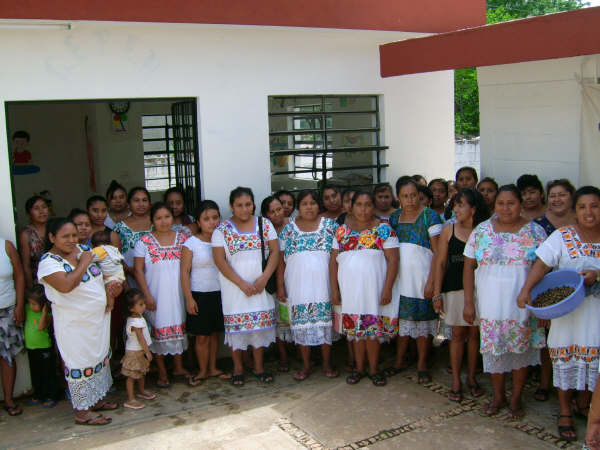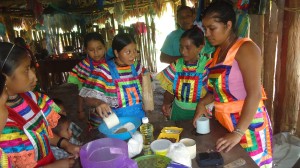
We started working in México in 2004 with Dr. Cecilia Sánchez-Garduño who had just finished her Doctoral thesis on Maya Nut in Veracruz and Chiapas. She began to conduct Maya Nut workshops for women in very deforested communities in Veracruz. From 2004-2007 most of her work was dedicated to creating teams of trainers throughout México and as of 2014 they have trained communities in 10 states, Veracruz, Yucatan, Chiapas, Nayarit, Jalisco, Colima, Quintana Roo, Puebla, Tamaulipas and San Luis Potosi.
Every year, in collaboration with local and national partners, our Maya Nut promoters teach workshops and implement reforestation projects throughout México. In 2010, the McCance Family Foundation financed Healthy Kids, Healthy Forests Maya Nut school lunch programs in Chiapas, which was extremely successful. During project implementation in Chiapas, 35 women learned to harvest and dry Maya Nut and 150 children received Maya Nut lunches twice/week.

Children in Chiapas, México receive calendars with their photos to help them remember to water and to chart the growth of the Maya Nut trees they planted. Dr. Cecilia Sánchez-Garduño photo
As a group, the promoters help link stakeholders throughout México. They work directly with landowners and help with research by investigators from various Universities and Institutiones throughout México
Among the interesting conclusions from these investigations has been discovering the importance of preventing Maya Nut seed movement from one ecoregion to another. Nahua people from preHispanic times knew this and today, genetic research carried out by Maya Nut Institute and researchers at the Museum of Natural History in London as part of the Darwin Initiative award (http://darwin.defra.gov.uk/) confirms the importance of respecting seed transfer zones to prevent “genetic contamination” of wild populations of Maya Nut. .
Because Maya Nut is widely distributed in more than 35% of Méxican states, there is enormous diversity of knowledge and historical customs related to it. Its a massive undertaking to understand, define and attempt to catalog all of the lost indigenous knowledge about Maya Nut in México. To date we have worked with approximately 200 communities in México to share information about Maya Nut recipes and nutrition, and they have shared a lot of knowledge with us. Nevertheless, there is still much work to be done in México to conserve both traditional knowledge about Maya Nut and the Maya Nut forests themselves.
A growing number of allies have contributed money, time, resources and staff to make trainings in communities possible. These include: Chiapas University of Arts and Sciences (UNICACH), National Forest Commission (CONAFOR) Comisión Nacional de Areas Protegidas (CONANP), Oxcutzkab Rural Development Education Brigade, Yucatán, Center for Technological Studies 140-Michoacan, South Coast University Center, University of Guadalajara, Jaguar Alliance, Mexican Center for Rural and Urban Transformation (AMEXTRA), National Commission for Art and Culture (CONACULTA), Papalote Children’s Museum(http://papalote.org.mx/arbol-ramon), Xanath Ecological Park, Family Development Institute (DIF), University of México (UNAM) (http://www.medicinatradicionalmexicana.unam.mx/monografia.php?l=3&t=ojite&id=7882) , Mexican Social Security Regional Hospital (IMSS), University of Yucatan (UADY), Maya Laakeech Foundation, Vallarta Botanic Gardens (https://www.vbgardens.org/), Universidad Autónoma de Morelos (UAEM), Centro de Investigaciones Tropicales (CITRO) (https://www.uv.mx/citro/), Indigenous Center for Nutrition and Environment (CINE), McGill University, Canada, as well as many generous private donors. Additional valuable trainings have been generously provided to the Mexican Maya Nut team by Exxon Mobil, the Center for Development and Population Activities (CEDPA), the Canada-Latin America and the Caribbean Research Exchange Grants program (LACREG), Alternativas, A.C. and Solar Household Energy (SHE-INC.)

Indigenous women in Chiapas receive training from a Maya Nut trainer, Aracely Gómez Jiménez, financed by CONANP. Filomena Estrada Tovar photo
Commercialization of Maya Nut in México is still in a nascent state. Because deforestation rates are so high in México, many producers simply don’t have access to Maya Nut forests necessary to produce commercial quantities of nuts. For this and other reasons (lack of markets, lack of experience, etc.) most Maya Nut producers in México sell their products locally. Most of these producers are satisfied with the local market and are not seeking to scale up production.
In 2009 Maya Nut Institute, México received the NGO Mobile Award “SMS in service of forests and families and women’s empowerment.
For more information about the Mexican Maya Nut program, please write directly to Dr. Cecilia Sanchez-Garduño in English or Spanish, at nativaramon@gmail.com or call her at 551-798-6205.
